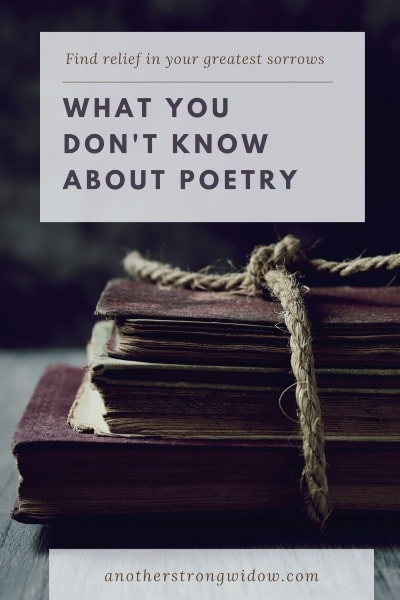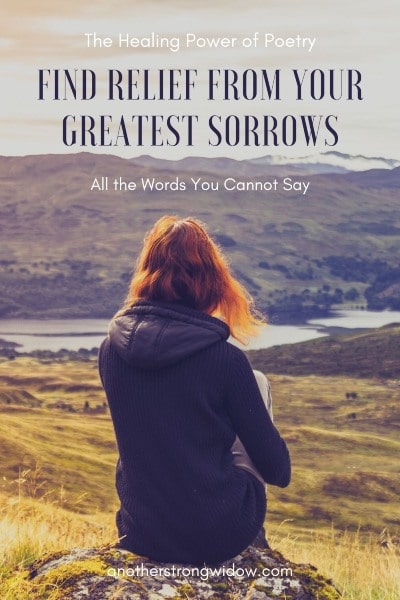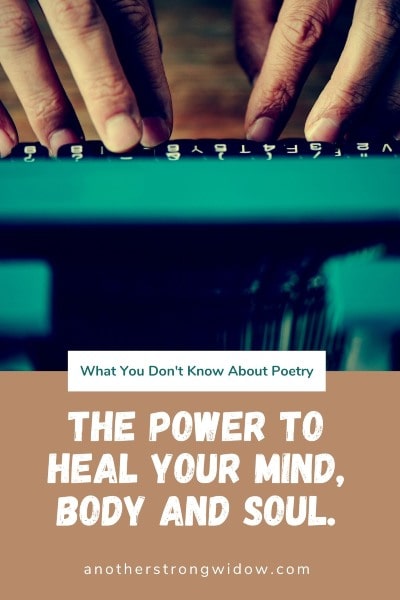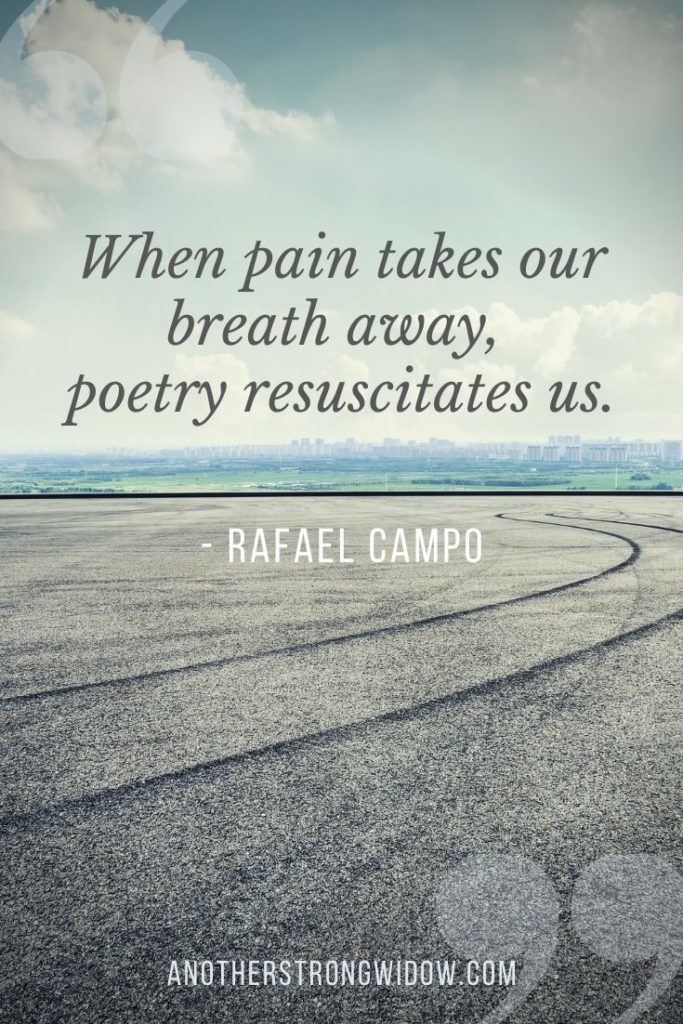Poetry has the strength to be heard when other words are lost.
Poetry can heal our pain, and take away the emotional and physical hurt.
For some, healing comes from expressing one’s self through writing poetry. For others, the therapeutic benefits are reading the rhythmic words out loud.
If you are lonely, poetry is a companion.
Poetic Therapy
Poetry is artistic writing where the author focuses on a powerful image, and then describes it.
It is self-expression of one’s feelings and can convert suffering into imagery.
After a traumatic experience, this expression of feelings offers a cathartic release, often leaving the author feeling relieved.
We live in a society void from talking about death and dying. We do not speak of our feelings, but when written as poetry, it becomes easier to expose our deepest thoughts and explore the opinions of our subconscious.

This post may contain affiliate links, which means I make a small commission from Amazon, at no extra cost to you, should you purchase any products using my link.
Poetry in Medicine
The use of poetry for therapeutic purposes traces as far back as ancient Egypt. The Egyptians would scribe poetic words on papyrus, dissolve them into a solution, and have the patient drink the healing verses.
Pennsylvania Hospital was the first hospital in the United States. It was founded in 1751 by Benjamin Franklin. At this location, Dr. Benjamin Rush was the first American to study mental disorder. Though some of his practises are very much outdated today, he is considered the father of American Psychiatry and prescribed writing and reading poetry to improve mental health.

In Greek mythology, Apollo is both the god of healing and poetry.
There is growing evidence that poetry can reduce pain, improve mood and increase hope in patients dealing with illness.
A study published in the Journal of Palliative Medicine, followed 75 cancer patients and concluded that passively listening to poetry decreased pain levels as well as reduced depression and increased hope.
Dr. Rafael Campo is a poet and a practicing physician at Beth Israel Deaconess Medical Center in Boston. He has recognized that as medical advancements increase, doctors become busier, and medicine tends to become less patient-focused and more about the data. Patients suffering from illness often feel unheard and isolated.
Dr. Campo shares an example at a TED talk that opened his eyes. A patient, addicted to pain killers, revealed that in addition to the pain of her body, her soul hurt. The next appointment, she returned with a guitar and a song she had written. When Dr. Campo listened, the barriers between doctor and patient broke down, he became more empathetic and had a more in-depth understanding — having empathy for the situation, encourages us to heal others.
Dr. Campo continues to bridge poetry with medicine and better understand a patient’s needs while working alongside medical records and facts. He teaches that if there isn’t going to be an additional round of chemotherapy, poetry can still heal. A collection of poems, inspired by his work as a physician, have been published in a book called, “Comfort Measures Only.”
“When pain takes our breath away, poetry resuscitates us.” – Rafael Campo, TEDxCambridge
Using Poetry to Heal
In times of extremity, when people are combating intense emotions, poetry is often used to express deep feelings.
Writing poems holds a space for reflection where the author strives to make sense of the events, understand the experience, and find meaning to the suffering.
A poem may not solve the problem, but it provides the emotional release needed to move onward and cope with the next step.
The Poetry of War
Writing about the trauma of war is so commonplace that the term, “war poet” can be applied.
The war poet, Wilfred Owen, was an English soldier in the First World War. He died at the age of 25, one week before the end of the war. His experiences of warfare are encapsulated in the poetry he wrote, perhaps telling the stories of extreme emotion he was unable to share in any other way.
His poem ‘Dulce et Decorum Est’ describes the horrors of war in the trenches and during a gas attack.
Dulce et Decorum Est
Bent double, like old beggars under sacks,
Knock-kneed, coughing like hags, we cursed through sludge,
Till on the haunting flares we turned our backs,
And towards our distant rest began to trudge.
Men marched asleep. Many had lost their boots,
But limped on, blood-shod. All went lame; all blind;
Drunk with fatigue; deaf even to the hoots
Of gas-shells dropping softly behind.
Gas! GAS! Quick, boys!—An ecstasy of fumbling
Fitting the clumsy helmets just in time,
But someone still was yelling out and stumbling
And flound’ ring like a man in fire or lime.—
Dim through the misty panes and thick green light,
As under a green sea, I saw him drowning.
In all my dreams before my helpless sight,
He plunges at me, guttering, choking, drowning.
If in some smothering dreams, you too could pace
Behind the wagon that we flung him in,
And watch the white eyes writhing in his face,
His hanging face, like a devil’s sick of sin;
If you could hear, at every jolt, the blood
Come gargling from the froth-corrupted lungs,
Obscene as cancer, bitter as the cud
Of vile, incurable sores on innocent tongues,—
My friend, you would not tell with such high zest
To children ardent for some desperate glory,
The old Lie: Dulce et decorum est
Pro patria mori.
* Dulce et decorum est pro patria mori is Latin for, “it is sweet and fitting to die for one’s country.”

Poetry in a Time of Crisis
In our modern society, it seems as if we fear poetry, being left with a bad taste in our mouths from our school days. There are concerns about misunderstanding poetry and getting the message wrong, but in times of desperation, when one is searching to make sense of emotions, writing poetry often becomes primitive.
The events of September 11th, 2001, in the United States offer an example of this.
“After 9/11 there was a massive outpouring of poetry everywhere…on telephone poles, public buildings, bus stations, and fire-stations; poetry was sent to police, firemen, and public officials. Poems were posted, pasted on windows, tweeted, and, in Curtis Fox’s words, ‘poetry was suddenly everywhere in the city.’ In fact, there was so much poetry submitted to firemen shortly after the event that a fire chief issues a statement saying, ‘Thank you for the food and blankets but please – no more poetry.’ ” – Lin Knutson, Representing 9/11: Trauma, Ideology, and Nationalism in Literature, Film, and Television
Nobel Prize winner for literature, Wisława Szymborska, writes a moving and simplistic poem that captures the horror that every onlooker remembers.
Photograph from September 11
They jumped from the burning floors—
one, two, a few more,
higher, lower.
The photograph halted them in life,
and now keeps them
above the earth toward the earth.
Each is still complete,
with a particular face
and blood well hidden.
There’s enough time
for hair to come loose,
for keys and coins
to fall from pockets.
They’re still within the air’s reach,
within the compass of places
that have just now opened.
I can do only two things for them—
describe this flight
and not add a last line.
You can find a well-reviewed collection of Wislawa Szymborska’s work here.
Cancer and Poetry
Being diagnosed and living with cancer is terrifying.
It is a traumatic experience to hear the news and patients (and caregivers) often react with disbelief and shock.
They struggle to come to terms with the new life ahead. When the period of numbness wears off, a mixture of anger, anxiety, and depression follow for many.
Few patients can manage the stress of the diagnosis on their own without additional support systems. Here is a list of ways that you can support someone with cancer.
Research is showing that expressive writing can improve your quality of life, and many are turning to poetry.
When my husband, Chris, was struggling with cancer, poetry was an outlet that he turned to.
Untitled Poem Written by Chris Baldwin
It used to just be a word,
one that I tried not to think about too much.
Now I’m so afraid.
It’s a low-down dirty word,
that steals from everyone it touches.
Sadness, loss, and anger.
It’s everything that could have been,
but now somehow is so different.
It’s a new baby being welcomed to this world,
an elderly couple saying goodbye before they are ready,
and a husband trying to know what to tell his son.
It’s knowing what you’re going to leave behind,
The best-laid plans just aren’t so anymore.
And we fight on.
Fuck you, cancer.
Chris passed away three months after writing this poem.
In addition to the stress relief that writing provided to Chris, it has also given insight into his fears and provides healing feelings to me.

Poetry in Grief
To lose a loved one is a painful experience that we will all eventually encounter.
Despite the universal nature of grief, our society tends to fall silent when it comes to offering support to the grieving.
Here is a compilation of great poems written about grief and loss.
In my experience, it seems that people would rather avoid me than talk to me about my grief. My very neighbours have never acknowledged the death of my husband, I presume, because it makes them uncomfortable.
It’s true; if you have never lost a spouse or a child, then you cannot understand. You may imagine what it would be like, but the reality is far worse than anything you can picture.
When you read the rhythmic words of another that relates to you, it becomes very comforting.
The poet, Donald Hall, wrote a poem after the death of his wife, it is simple, yet says it all.
An Excerpt from Distressed Haiku
You think that their
dying is the worst
thing that could happen.
Then they stay dead.
You can find Hall’s complete poem here.
Reading Poetry to Heal
Writing poetry soothes the soul of the author, and in return, leaves a gift that can unburden the reader.
The above poem about cancer, written by my husband, is now one of the greatest gifts I have from Chris. It represents all of the feelings he had but never expressed to me. I hold these words, captured by him, like a piece of his soul, and in a way he lives on.
The beauty of poetry is that when you read a poem,
you are given a pause for breath after each line.
You don’t just read it,
you also feel it.
The words get inside of you,
and are delivered to your heart.
Reading poetry is comforting and can let us know we are not alone. Feelings that are difficult to convey can be put into words, describe emotions and give others something to relate to.
Karin B. Miller’s husband was diagnosed with cancer at the age of 34, while they were expecting their first child. Karin turned to poetry and put out a call for other’s poems about cancer. The response was overwhelming and resulting in two published books, “The Cancer Poetry Project: Poems by Cancer Patients and Those Who Love Them.”
Writing Poetry
The next time that you feel like you have so much to say on the inside, but can’t seem to find the words, perhaps try and write a poem.
Begin by thinking about an image.
- What do you miss most about the person you love?
- How do you feel when you are awaiting test results?
- What could you hear, smell or feel on that summer day?
Take that image and turn it into a sensory experience by making a comparison.
- What animal is your image most like?
- Is your image like a weather event, part of nature, or landform?
- Can you make a connection to a sports game or country?
Example:
The glow from your eyes fades,
like dying daylight of autumn days.
Chemotherapy invades.
Let your imagination move freely; write down everything that you wish you could say.
There are no rules for writing your poem, and you do not need to share your finished product with anyone.
Pin this article for later.

Can you share a time that you were able to relate to a poem that you read?
Have you ever written poetry to help you through an emotional event? Or are you like me and tend to shy away from all things poetry?
Hopefully, this article has opened your awareness to the joys of poetry as well as the healing aspects it tends to afford us. Poetry really is for everyone.





Thank you Janice. This blog reached into my past. I was 18 when I lost my father and in Nursing school so was away from my family. A month after his death, I wrote a poem about him and some of the important (to me) aspects of his life. It helped me to do that. I gave it to my Mother and when she died 28 years later, my brother found it in her big family Bible. It brought back many good memories and truly touched my heart ….. it provided a form of grief therapy during the loss of my Mother.
I truly look forward to your blogs and I believe that they bring a sense of healing for you and to all who read them..
I enjoyed this story and am so excited that you shared it with me. Thank you 🙏🏼. It is wonderful to hear others experiences with poetry and healing.
This is beautiful! After I lost my full term newborn son, I wrote a poem and song expressing my loss and pain. It’s so helpful and a great way to express emotions. Thank you for sharing this!
I am so sorry for your loss. Thank you for sharing with me, I love that you found comfort in poetry.
I’m so sorry for your loss.
Thank you for sharing the power of poetry! It is woefully underappreciated
Thank you Emily.
So sorry for your loss. Finding the right words is quite an uphill task. I guess that’s where poetry helps take off the edge. Am also in the middle of writing a collection of poems on pain
I used to love writing poetry but in all the hustle and bustle dont anymore. thanks for this view.
I used to write poetry when I was younger, nothing mind blowing or special, but I agree I found it quite therapeutic. Especially when I was writing about some tough times that were going on.
Thank you for sharing x
This is fascinating! I was an English major in college and I always loved my poetry classes. I had no idea it was used for healing!
Thank you! Yes! I loved everything I learned about poetry as I wrote this post. I would never have considered myself a “poetry” person before either but I think it is a very special way to express oneself.
Thank you for your post! I think people underestimate the effect poetry can have in a world so focused on technology. We need more people to acknowledge it sometimes. 🙂
I honestly love this.. poetry has gotten me through so many hard times thank you so much for your insights and research!!! Very good read!!!
Thank you so much Daeja, a wonderful compliment!
I so love poetry, writing it and reading it. It has helped me through some of my darkest times but has also let me celebrate some of the greatest moments of my life.
Aw, this was an incredibly nice post. Finding the time and actual effort to make a really good article… but what can I say… I put things off a whole lot and never manage to get nearly anything done.